As you can see, I've had a little surplus time over christmas for a long time project I've had cooking for some months now.
Proudly presenting to you:
German Grosses Torpedoboot 1913
Introduction:
After the failure of the Torpedoboot 1911 (V1 - V6, G7 - G12, S13 - S24) - they were designed smaller than their predecessors in order to be more maneuverable while carrying the same armament, but paid dearly in terms of short range and woefully poor seakeeping abilities - the Imperial Navy reverted to a larger type of destroyer for the FY1913 flotilla. At over 800 tons, the Grosses Torpedoboot 1913 was the largest destroyer type ever built for the German Navy so far and the first with oil-burning machinery. They compared rather indifferently with their british contemporaries: Although they were faster and had more torpedoes (6 500mm tubes versus 4 533mm ones, although two of them were arranged to fire forward which was a little-used feature), they were smaller, less seaworthy, had shorter range and inferior gun armament (only three 88mm guns; the British L-class had three 102mm pieces). The German boats were however robust, reliable and could be built in large numbers at short notice when they were needed. By early 1917, no less than 71 had been delivered, and they bore the brunt of the heavy fighting against the Royal Navy and the Russian Czarist Fleet, with 27 losses, most of them to mines. Six were scuttled during the German retreat from Belgium, and most of the rest went to Scapa Flow with the Hochseeflotte; by 1925, only two remained afloat, one in French and one in Italian service.
Due to German practice to provide only broad specifications and leave much of the details to the builders, the Class can be divided into ten subclasses, as depicted below:
1. V25 Group (FY 1913 peacetime order)
These six vessels (built by the AG Vulcan yard in Stettin, hence the V-designator) still showed a typical prewar design with a low bridge for minimum visibility. V25 trialled embarking a Friedrichshafen FF type airplane in 1915. As with all German destroyers, there were only relatively minor modifications during the war, mostly added bridgework, improved W/T rig at the foremast and provisions for four 7,92mm machineguns, although the latter were not usually mounted (except on the destroyers stationed in Belgium from 1917. Initially, all German destroyers were painted black; in November 1916, a new dark gray paint (I have still not found the exact formula, so my hue should be regarded as provisional) was introduced, but it took about a year to repaint all destroyers. During 1918, the majority of them had their midships hull sections painted black again, with the bows, sterns and superstructures remaining gray.
V27 in 1914
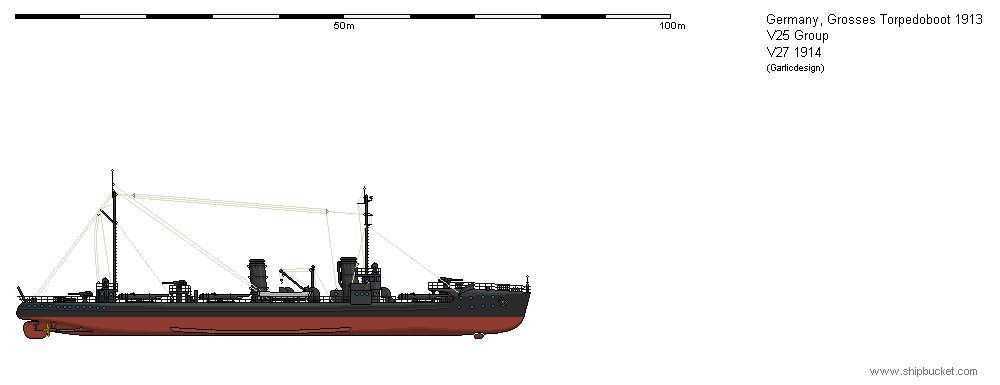
V25 in 1915
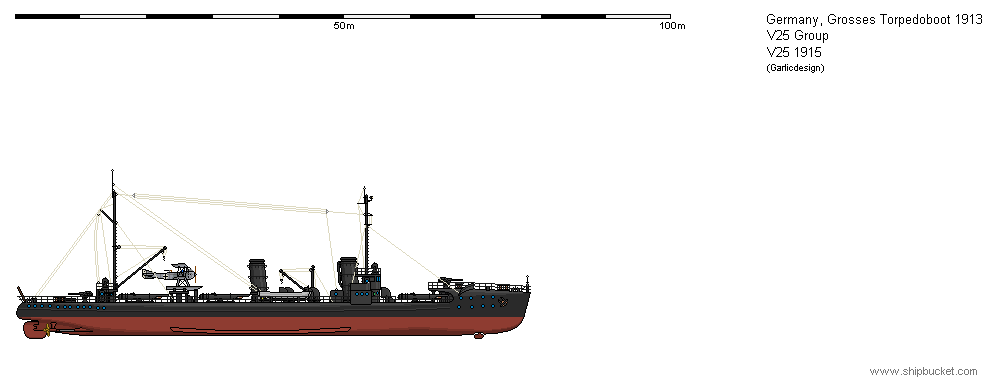
V30 in 1916
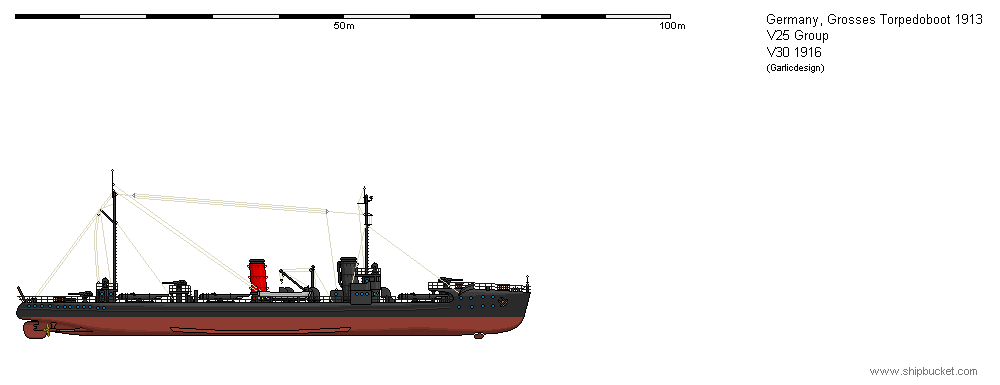
V26 in 1917
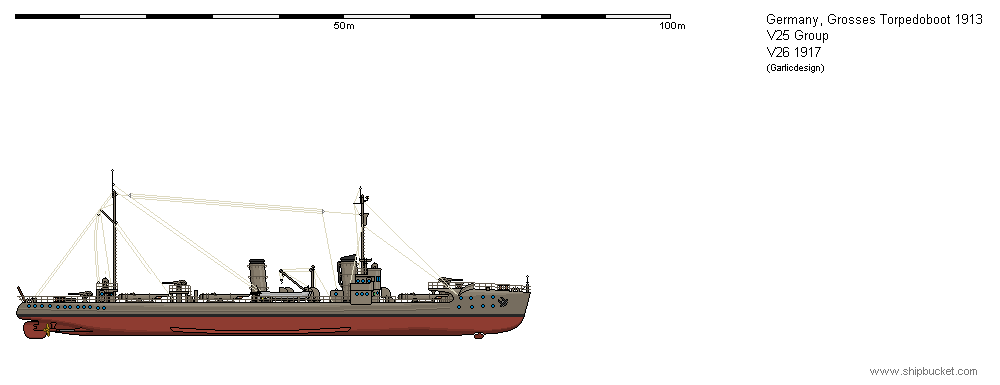
V28 in 1918
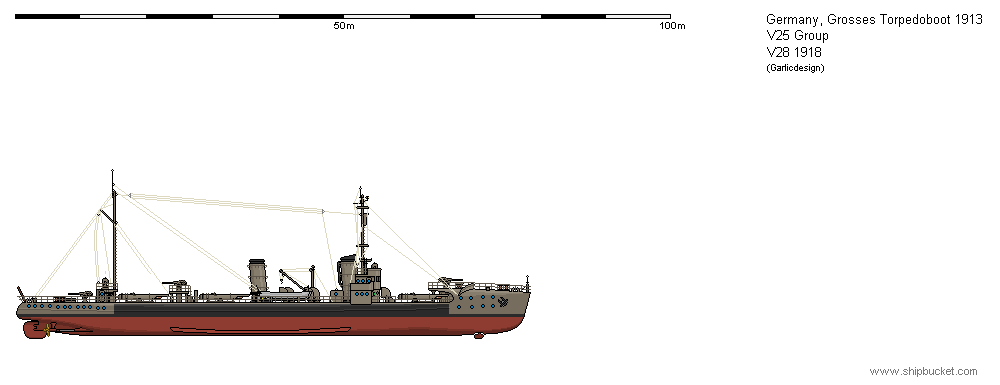
2. S31 Group (FY 1913 peacetime order)
This subclass of 6 units, built by the Schichau-Yard in Danzig (hence the S-designator) already had a more pronounced superstructure, as would become typical for later subclasses. One quintessentially German detail was the forward ventilator, which was trunked into the forward superstructure and had its intakes on the sides in order to prevent water from entering the boilers through the ventilator - a feature later also introduced by Vulcan-boats. The arrangement did however not seem to work particularly well because later Schichau-boats got rid of it again in favour of more conventional ventilators. Modifications (or lack thereof) pretty similar to the V-boats.
S32 in 1914
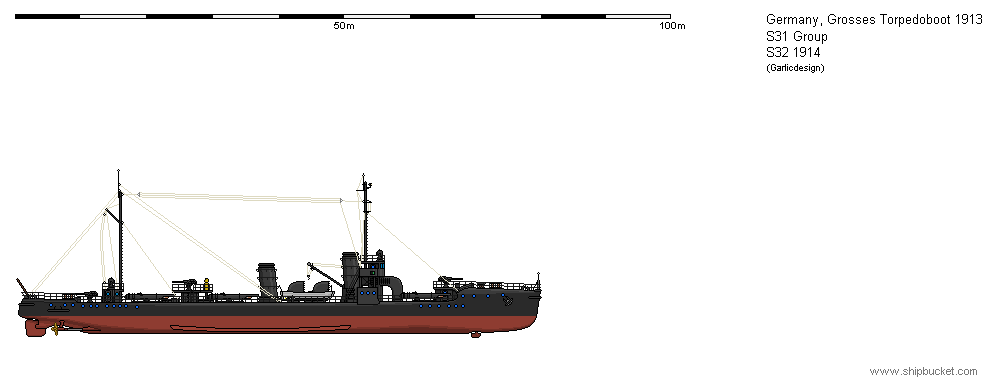
S34 in 1916
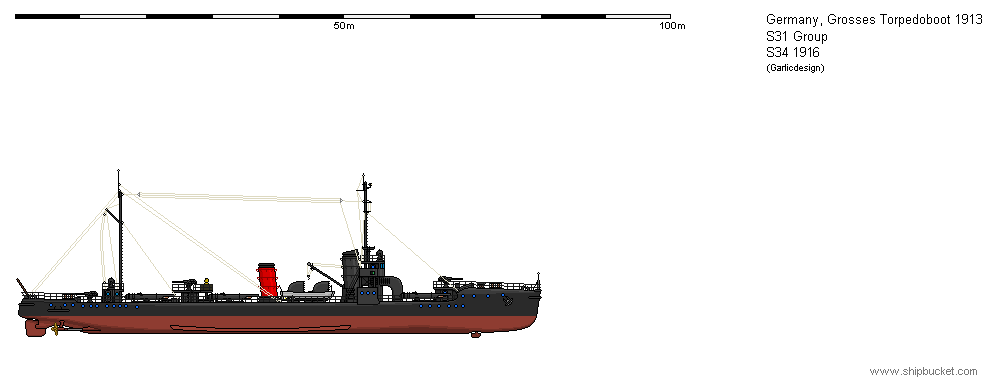
S33 in 1917
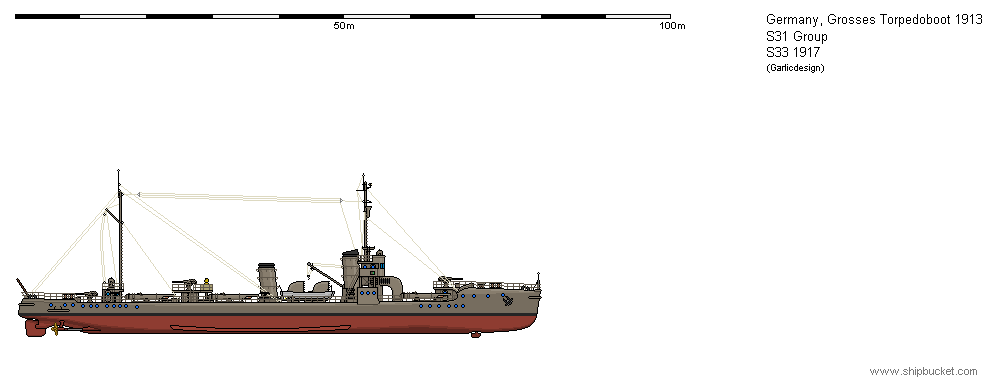
S36 in 1918
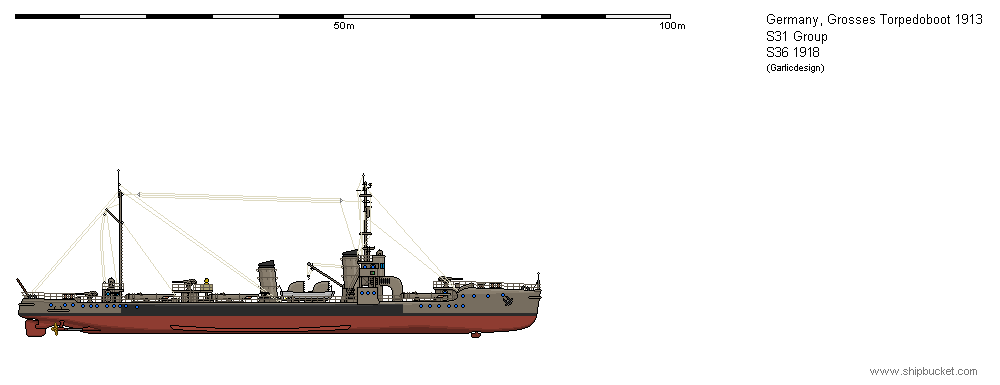
3.
G37 Group (including G41 subgroup - FY 1914 peacetime order)
The first half of the last pre-war destroyer batch consisted of six units built by the Germaniawerft at Kiel (hence the G-designator). They differed from the V- and S-boats by having the bridge much further forward. This made the bridge higher and significantly less wet; the bridges of the early V-boats in particular were constantly soaked with spray water hitting equipment on the well deck before the bridge. Although the G-boats looked bow-heavy, they were rated the best sea-boats of the 1913 type and the most comfortable and habitable of them into the bargain as well. On the minus side, the G-boats, having a better finish overall, took longer to build and had a reputation of steering less well than the others. The last two (G41 and G42) were lengthened by 3,5 meters while on stocks to adress the range issue; they received 15% more fuel and a cruising turbine. They thus formed a subclass of their own. Due to their extra size, they had enough weight reserves to swap their 88mm guns for 105mm pieces late in 1916 after the experience of Jutland had shown the gunnery of the 1913 torpedo boats to be deficient. Only G41 received the up-gunning because G42 was lost before it could be implemented.
G37 in 1915
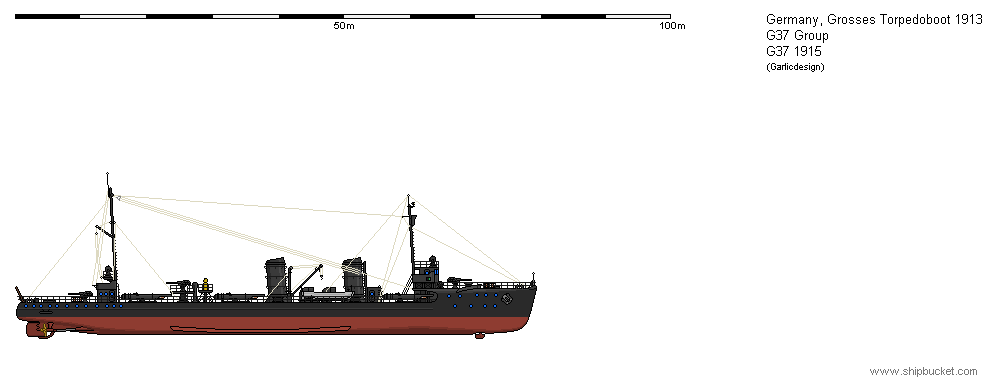
G38 in 1916
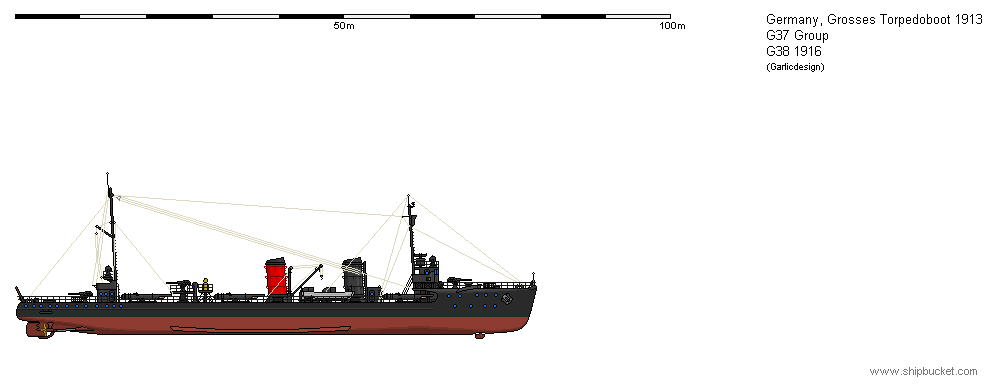
G41 in 1916
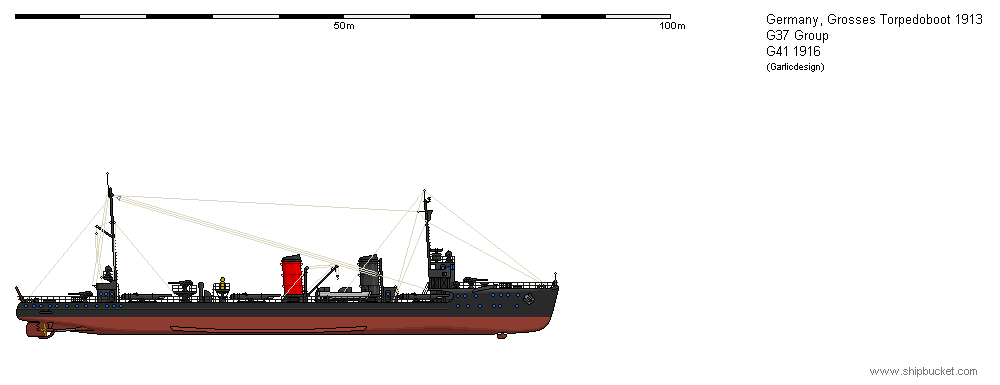
G42 in 1917
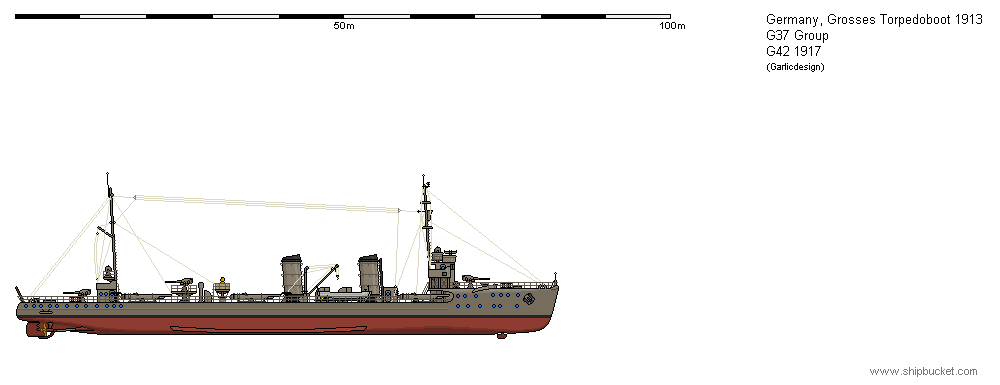
G39 in 1918
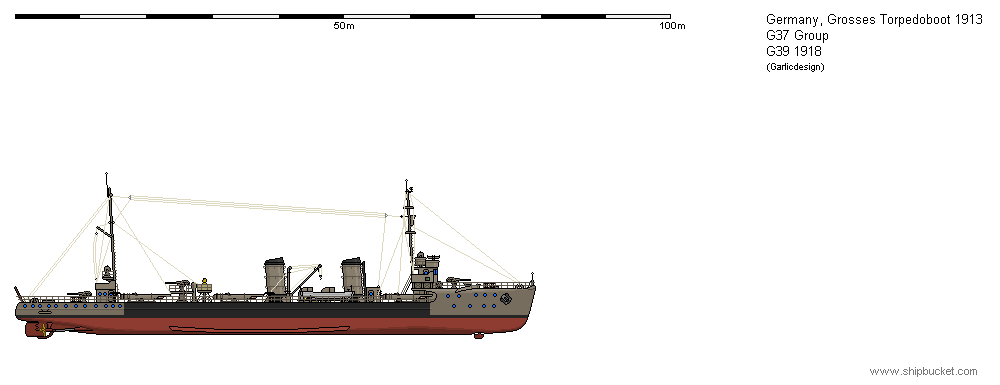
4.
V43 Group (including V47 subgroup - FY 1914 peacetime order)
The second batch of Vulcan-built boats resembled the first batch, but were slightly larger in every direction; they also had a heightened bridge. The last two were lengthened by 3,5 meters while building in a similar fashion as G41 and G42; they also were up-gunned to 105mm pieces late in 1916.
V43 in 1915
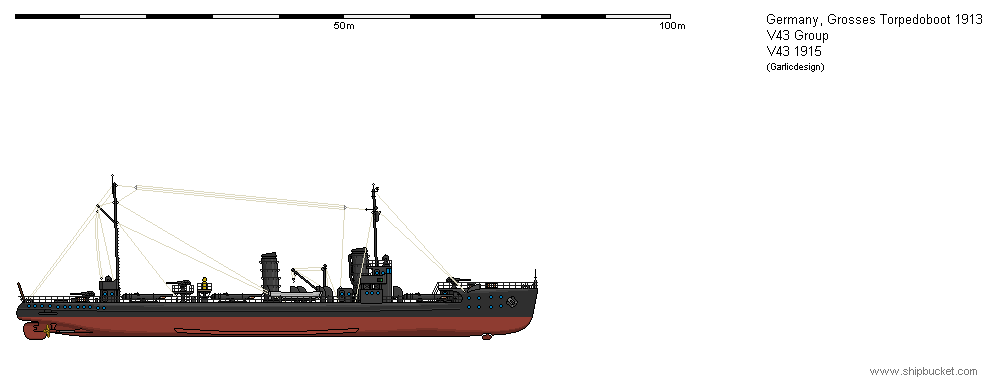
V44 in 1916
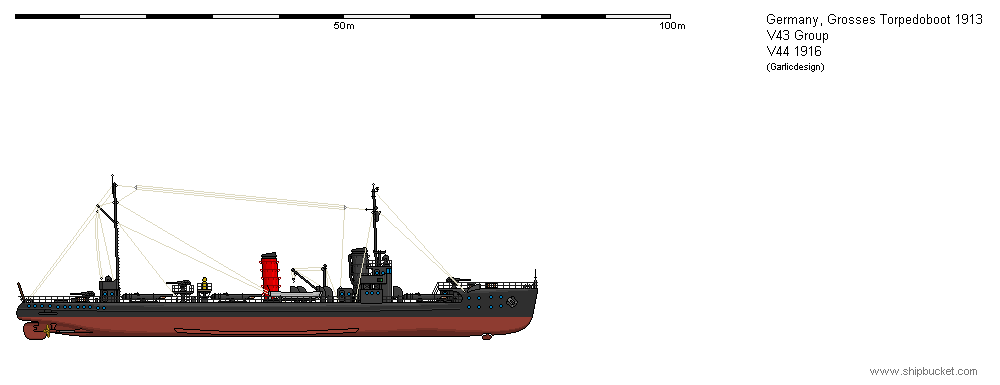
V48 in 1916
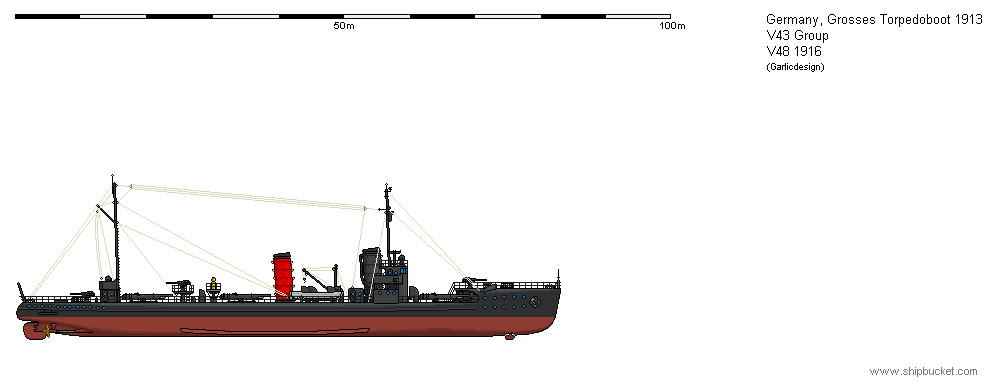
V45 in 1917
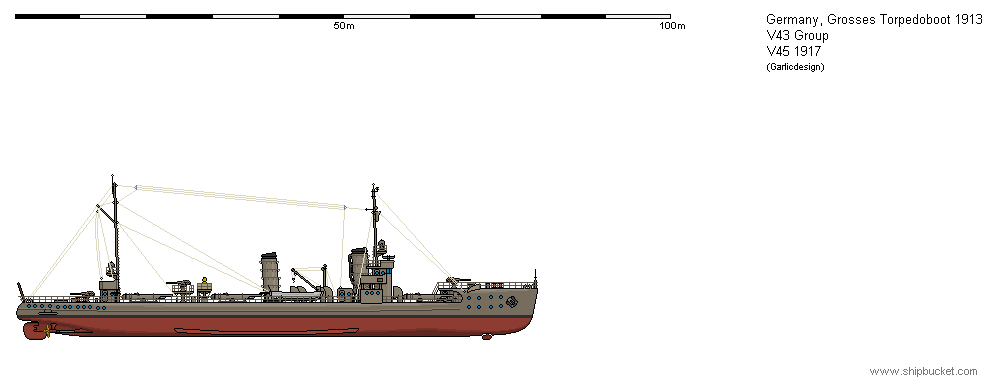
V46 in 1918
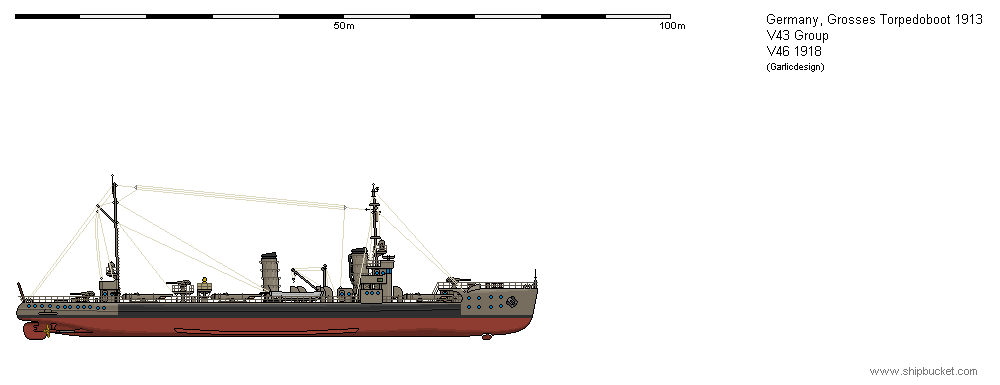
V47 in 1918
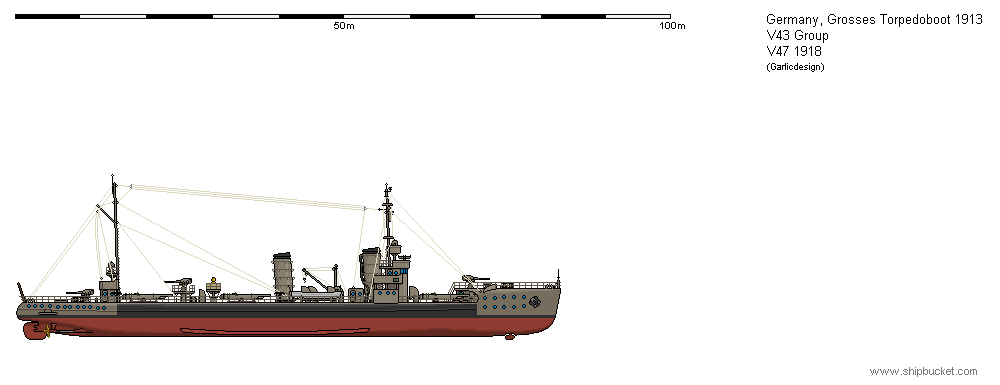
5.
S49 Group (Mobilization order 1914)
As the 1913 torpedo boats were in series production when Germany stumbled in the First World War, the class was chosen for mass production under the mobilization programme. Rather than standardizing a single design, all three yards continued to build their own designs; eighteen each were ordered from Schichau and Vulcan, and twelve from Germania. The first four Schichau mobilization boats were largely similar to the earlier ships, but reverted to a simpler type of ventilator forward. None of them was lengthened, however, and consequently, none of them was later upgunned.
S50 in 1916
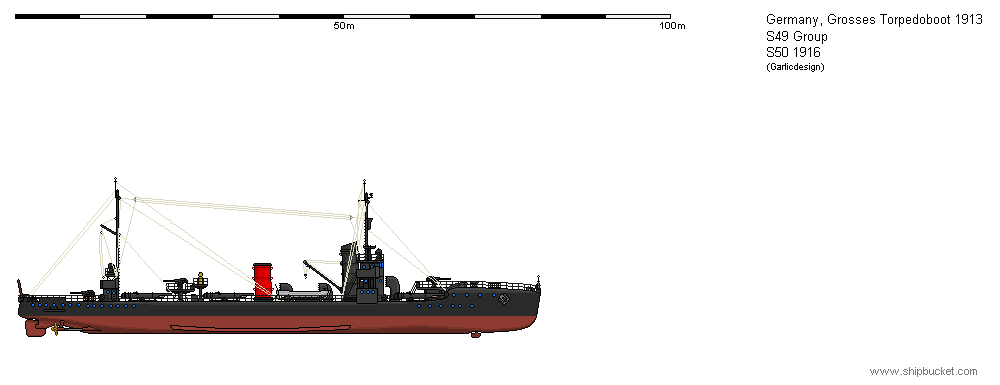
S52 in 1917
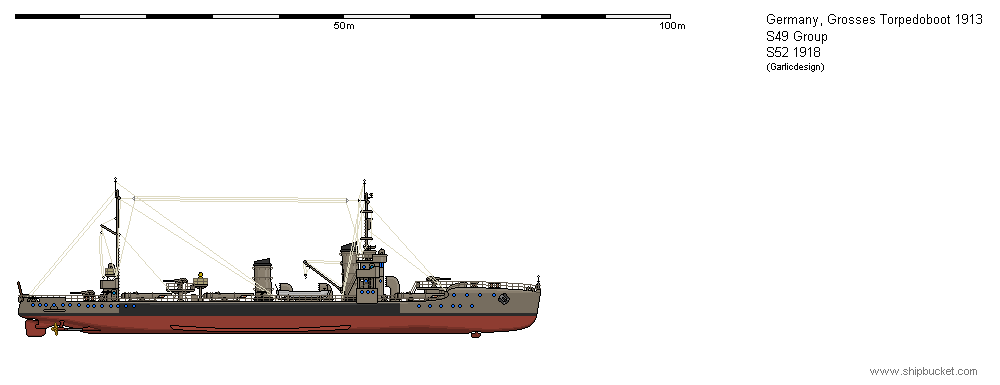
6.
S53 Group (Mobilization order 1914)
The next 14 Schichau boats received the longer hull with increased range from the beginning; the forward ventilator was modified again, and the funnels received characteristic high funnel caps unique to the Schichau boats. The first seven were completed with 88mm guns, but later upgunned to 105mm pieces. The last seven had 105mm guns from the start.
S53 in 1916
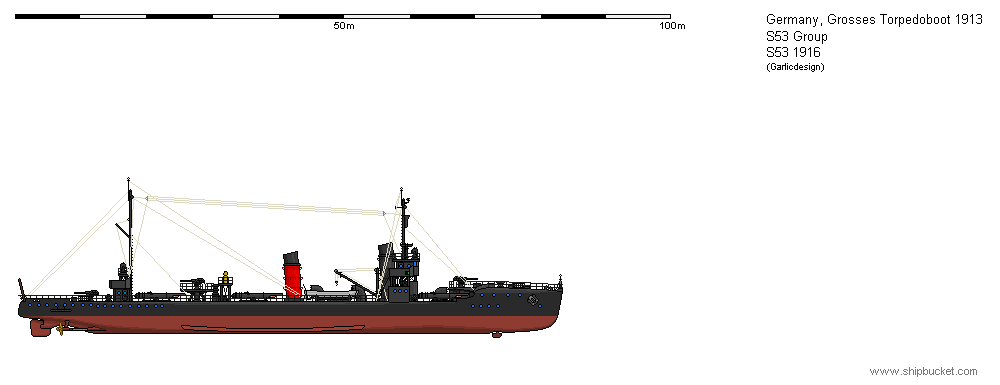
S60 in 1917
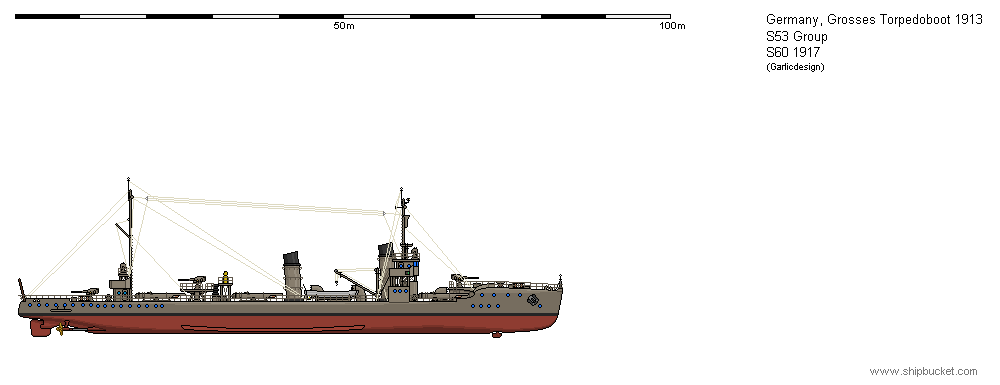
S62 in 1917
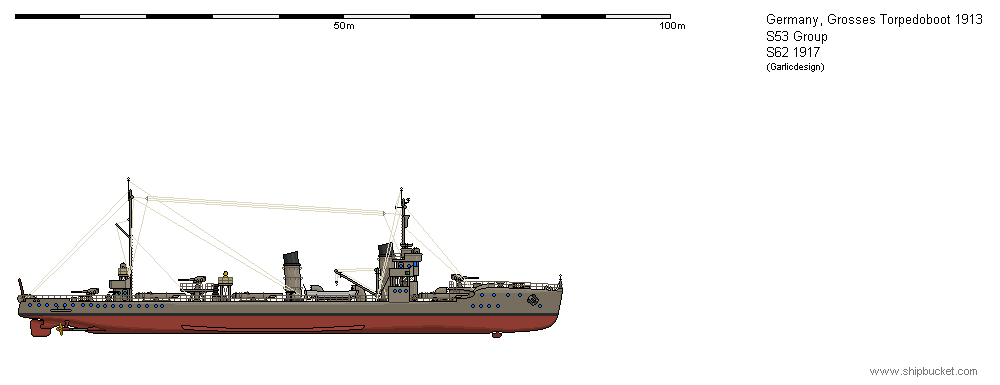
S55 in 1918
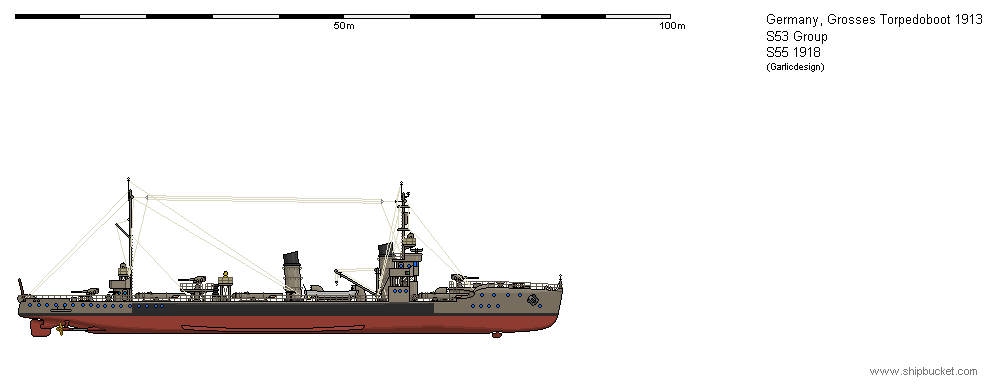
7.
V67 Group (Mobilization order 1914)
The 18 Vulcan-boats of the mobilization order were all alike. All had long hulls, and all later received 105mm guns instead of their 88mm pieces; only the last three (V82 - V84) had them from the start. While Schichau was getting rid of their awkward forward ventilator design with their later batches, the Vulcan boats now introduced these; the reasoning (if any) behind this escapes me.
V70 in 1916
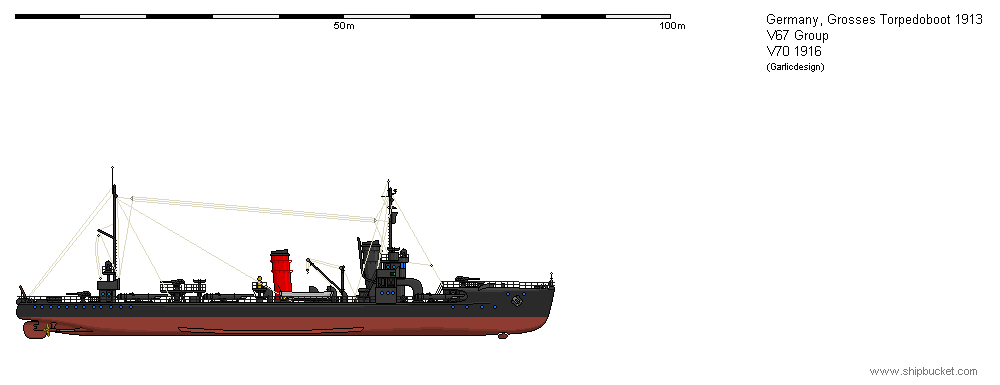
V82 in 1917
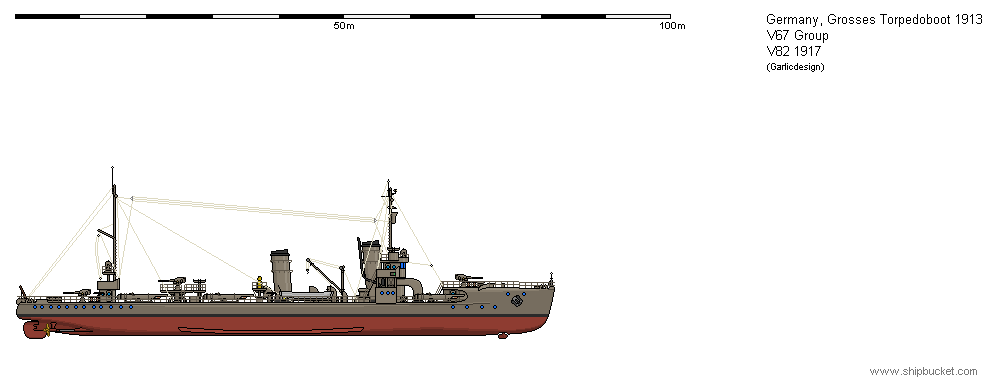
V67 in 1918
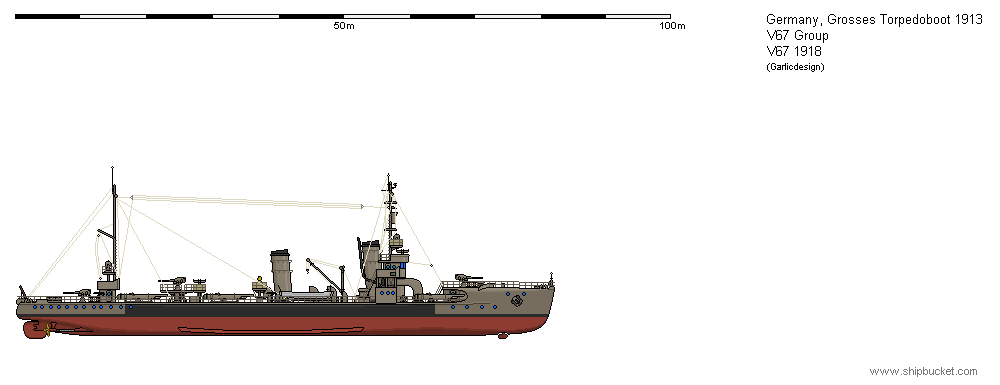
8.
G85 Group (Mobilization order 1914)
Only 12 mobilization destroyers were ordered from the Germaniawerft in Kiel, probably due to that yard's preoccupation with submarine construction. Unlike the other batches, construction of the Germania boats were not commenced prior to early 1915. They were similar to the last two of the 1914 batch; all had the long hull from the start. The last three carried 105mm guns from the start, the others later were retrofitted. The twelfth unit - G96 - was finished to a thoroughly reworked design with a much longer forecastle and accordingly better seakeeping; it differed from the other eleven so much that it was rated as an entirely new class (Grosses Torpedoboot 1916mob) and became the prototype for the follow-up destroyer type (a drawing will be posted later, together with the other 1916mob boats).
G85 in 1916
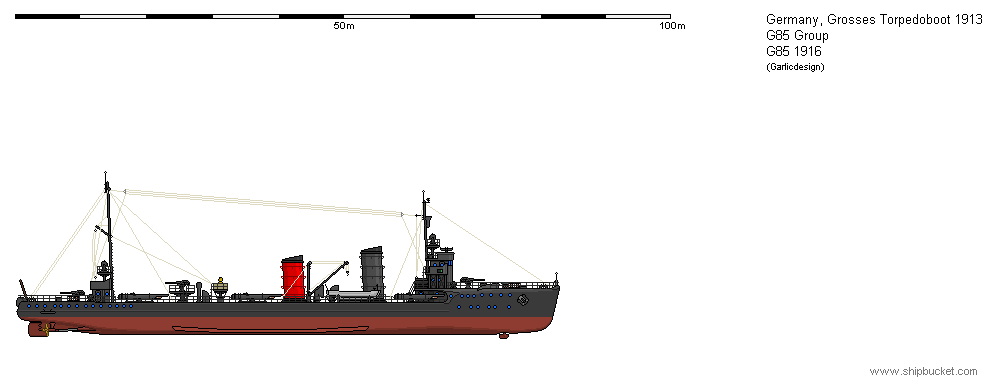
G92 in 1917
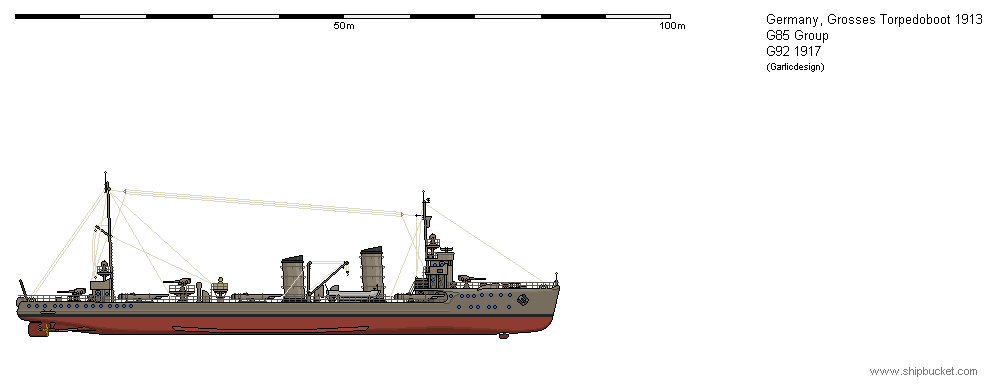
G89 in 1918
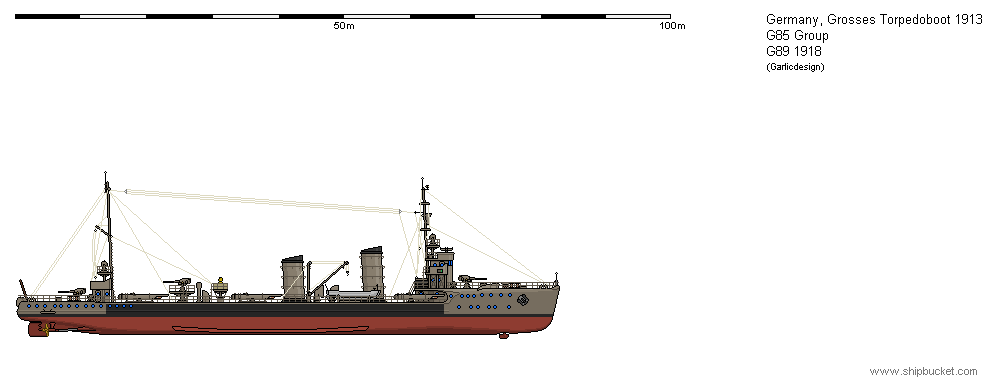
Pffft... more to come, but don't ask when, I can't see destroyers any more for a few weeks...
Greetings
GD
